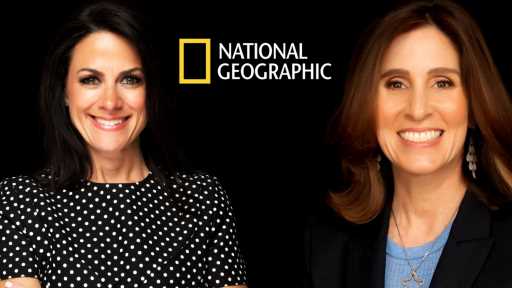National Geographic Executives Courteney Monroe & Carolyn Bernstein Double Down On Docs, Laud “Bespoke” Approach
Clouds of gloom have settled over much of the documentary field, brought on by multiple factors: a sluggish acquisition market, cutbacks in the executive ranks at Netflix and Showtime, uncertainty around Hulu’s future, CNN Films taking doc production in house, sharper scrutiny of budgets and content needs, and… well, the list goes on.
But there’s at least one bright spot it the nonfiction firmament – National Geographic Documentary Films. Coming off its latest Oscar nomination – for the feature Fire of Love – the unit of the Walt Disney Company is leaning into documentary production with half a dozen films set for release or in the works.
Related Story
National Geographic Blasts Off With 'The Space Race,' Documentary On NASA's Black Astronauts – Reaching For The Stars, Tethered By Racial Prejudice
First up: Wild Life, a film Carolyn Bernstein, EVP of global scripted content and documentary films for NatGeo, calls “a big, beautiful love story.” The couple at the heart of it – Doug and Kris Tompkins — left the corporate world for life in remote Chile.
“She was the CEO of Patagonia, he was the founder of The North Face and Esprit with his ex-wife Susie Tompkins,” Bernstein noted. “Kristine and Doug met each other in middle age and fell madly, madly in love.”
Together, they acquired millions of acres of land in Chile and Argentina, with the express purpose of turning it into national parks, a project Kris continued even after her husband’s tragic death in 2015. The film directed by Oscar winners Elizabeth Chai Vasarhelyi and Jimmy Chin (NatGeo’s Free Solo) opened theatrically in New York and DC on Friday and expands to Los Angeles and other markets in the coming days and weeks.
National Geographic is also pairing with Vasarhelyi, Chin and filmmaker Natalie Hewit for Endurance (working title), a chronicle of the search for Sir Ernest Shackelton’s ship, which sank near Antarctica in 1915 after becoming trapped in pack ice.
“The story we’re going tell with Chai and Jimmy is set in two timelines,” Bernstein explained. “It’s both the gripping, extraordinary, incredible story of finding and then kind of excavating the Endurance today. And it’s also jumping back in time to the unbelievable story of grit and determination and perseverance… of Shackleton’s original expedition and what happened with [his crew] after the ship sank.”
“We fought very hard to get exclusive access to the expedition that was in search of and ultimately found the Endurance,” added Courteney Monroe, president of National Geographic Global Television Networks. “We didn’t know if they were going to find it, of course, but we wanted in on that.”
Stories About “Real Life Superheroes”
Over lunch in Los Angeles, Monroe and Bernstein talked with Deadline about the documentary banner’s secrets to success. In its six years of existence, the nonfiction film unit has landed nine films on the Oscar shortlist, earned three nominations and one win, for Free Solo. Previously part of 21st Century Fox, National Geographic came under Disney control after the company’s 2019 acquisition of Fox assets.
“This banner is emblematic of a larger journey for National Geographic overall, which has really been about transforming ourselves from reverence — which is the word you would maybe historically assign to National Geographic — to relevance,” Monroe said. “The way we’re doing that… is upholding the incredible legacy of this brand with the utmost respect… but really wanting to push creative boundaries and take really ambitious swings. Fire of Love is a perfect example of an ambitious and inspired swing and sort of modernizing and pushing boundaries.”
Bernstein noted, “There’s nutritional value to every story we tell you. You’ll learn something about yourself, about the world around you. When you watch our docs, it’ll make you think more deeply about the human condition.”
Monroe says another connection between NatGeo films is the conceptual approach to storytelling – character driven, versus what might be called “issue-focused.”
“If you think about Alex Honnold [Free Solo], you think about Jane Goodall [Jane], you think about Carl Sagan,” Monroe said, “you think about the cave divers who rescued the Thai boys soccer team [The Rescue], Dr. Armani in The Cave, the Kraffts [Fire of Love] — so brave, furthered our understanding of the natural world — Jose Andrés [We Feed People] — those are real world superheroes. People love aspirational, inspirational stories, superheroes changing the world. We tell stories about real world superheroes.”
Some projects have come to National Geographic through a bidding war, like Fire of Love, which attracted multiple suitors at the 2022 Sundance Film Festival.
“It was competitive,” Bernstein acknowledged. “And we often get into competitive situations. The thing that we can offer filmmakers that I think is one of our unique selling points is that if you come to us, we will not just support your creative vision — which is probably the most important thing — but we will also figure out the best strategy to amplify and elevate the film and push it out to as many people around the world as possible in a really bespoke way. “We can’t always write the biggest check –”
“We often do not write the biggest check,” Monroe interjected.
“But we often win when it’s competitive because it’s a different value proposition,” Bernstein added. “We are offering something that I think a lot of our competitors are not, which is a huge amount of tender loving care around both the development and production of films, and then everything that happens after in terms of distribution to bring that film to the world.”
The “Mission” Of NatGeo
Among other upcoming projects that will get the bespoke treatment are The Mission, a film by Jesse Moss and Amanda McBaine (Boys State). It focuses on John Chau, an American evangelical Christian missionary who set out to convert the Sentinelese Indigenous group living in isolation on an island off the Indian coast. But he was cut down by arrows shot by the Sentinelese who ardently oppose any attempts from outsiders to contact them.
“It’s both a very deep, emotionally-resonant story of a father trying to understand his son and his son’s decisions, and also a bigger thoughtful story about a lot of important, interesting issues of the day,” Bernstein said. “It asks all these deep questions about the history of colonialism and anthropology, and we even take a look at NatGeo’s history, the magazine, of exploration, and again, at what price.”
The upcoming Space Race, directed by Lisa Cortés and Diego Hurtado de Mendoza, will suit up with pioneering Black astronauts at NASA, who encountered enormous obstacles in their quest to exceed the bounds of Earth.
“It looks at systemic racism, it looks at civil rights struggles but through the first-person accounts of these men,” Bernstein said, “from Ed Dwight, who was Kennedy’s handpicked Black astronaut in the very early days of NASA, who was sort of chewed up and spit out by the space program, all the way through to Charlie Bolden, who was a pioneering Black astronaut and became the head of NASA under Obama.”
Also in the cosmic realm, National Geographic has announced plans for an untitled documentary on astronomer and astrophysicist Carl Sagan, to be directed by Nanette Burstein and executive produced by, among others, Ann Druyan – Sagan’s life partner – and Seth MacFarlane.
“The idea of doing a definitive doc about Carl Sagan,” Bernstein said, “that’s a total no brainer for us.”
Bobi Wine: The People’s President, directed by Moses Bwayo and Christopher Sharp, meanwhile, revolves around the titular music star who became a leading opposition political figure in his native Uganda.
“The documentary really follows Bobi’s journey and transformation into a kind of a folk hero,” Bernstein explained. “It’s not dissimilar from President Zelenskyy’s story… who was an actor turned politician.”
Saying No To Algorithms
As those films await release, National Geographic fields several docs in the Emmy race, including The Territory and Retrograde, both of which made the Oscar shortlist. For Retrograde, filmmaker Matthew Heineman embedded with U.S. Green Berets fighting in Afghanistan. When the Biden administration announced it was ending U.S. military involvement in the country, Heineman saw the premise of his film unravel. Monroe and Bernstein said they didn’t blanch when Heineman pivoted to focus on an Afghan Army general who tried to hold back the surging Taliban.
“We have to trust our filmmakers’ instincts,” Bernstein said. “We are there to support them, to remove obstacles, to gently course correct, occasionally, but for the most part, we’re really there to help them achieve the full flower of their vision, whatever that is. Once we commit to being in business with them, we’re fully committed from a creative perspective, and financially and otherwise.”
Some documentary filmmakers have privately told Deadline they increasingly get notes from streaming entities that push them to edit their films according to what algorithms suggest audiences want. Not so with NatGeo, the execs insist.
“We don’t make films unless we have a mind meld, truly, with the filmmaker and we aren’t completely madly in love with that film and with that filmmaker’s vision,” Monroe said. “And never once has the word ‘the algorithm’ come out of our mouths, never once.”
Must Read Stories
Fox News-Dominion Trial Pushed To Tuesday Amid Rumor Of Settlement Talks
‘Citadel’ Season 2 To Film In California; Amazon Series Among 7 To Secure State’s Tax Credits
No. 1 Of 2023 At $678M Global; $87M U.S. 2nd Weekend Record For Toon Film
NBC-BBC Co-Order; Evan Shapiro & Susan Zirinsky Keynotes; Day 1 Deals & More
Read More About:
Source: Read Full Article















